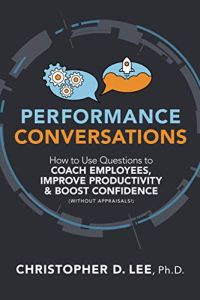加入 getAbstract 阅读摘要

加入 getAbstract 阅读摘要
Christopher D. Lee
Performance Conversations
How to Use Questions to Coach Employees, Improve Productivity, and Boost Confidence (Without Appraisals!)
SHRM, 2020
看看什么内容?
Replace the annual performance review with more frequent and effective coaching conversations based on powerful questions.
Recommendation
The traditional performance review has few remaining adherents. According to longtime chief human resources officer Christopher D. Lee, organizations should replace such reviews with regular, one-to-one feedback sessions between frontline managers and their reports. Lee explains why these conversations are critical to employee engagement, retention and company performance. Moreover, he writes, managers must learn to act as coaches rather than bosses, which means asking the right questions to learn what’s working, what’s not and how to help employees grow.
Summary
About the Author
William & Mary University’s chief human resources officer Dr. Christopher D. Lee has spent the better part of the past three decades as a Chief Human Resources Officer. He also teaches HR at the University of Richmond.





























Comment on this summary